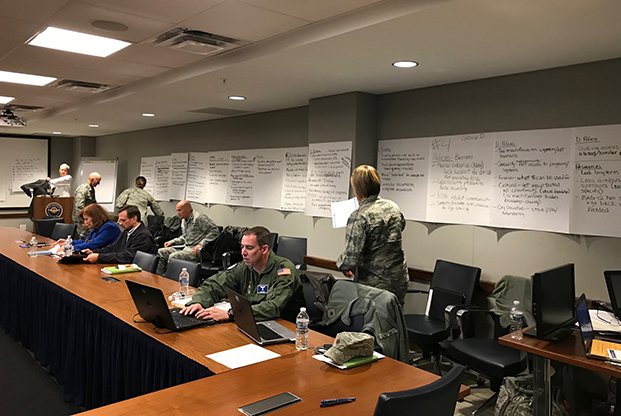
Many of the sessions during AF PEAT's Dec. 18 Roadmap Evaluation Physiological Episodes Action Team hackathon resulted in walls full of ideas and courses of action. Air Force photo by Maj. Christi Opresko.
USAF’s Physiological Episodes Action Team recently held a “hackathon” in northern Virginia to refresh its game plan for reducing the service-wide occurrence of the mid-air health emergencies, according to a USAF release.
“A physiological event occurs when aircrew experience symptoms that can result from a variety of factors, including hypoxia [oxygen deprivation], hypocapnia [low carbon dioxide levels in the blood], hypercapnia [elevated carbon dioxide levels in the blood], or disorientation,” the Air Force wrote last year. “These symptoms can hinder [pilots’] ability to fly safely and effectively.”
During the full-day mind-meld, experts from the fields of data science, engineering, human physiology, and defense—plus “pilots, maintenance leaders, acquisition professionals,” and representatives from academia and industry tackled the growing problem.
“Many of these concerns focus on coordination and communication between research, sensor development, and system improvements/redesign from the T-6 Texan II level, across other aircraft, and all the way up through Department of Defense level,” the USAF release continued.
Discussion topics included algorithms, machine learning, data parsing and more. Artificial intelligence experts from Google also weighed in on how the Air Force team could “leverage technology and move into the future faster,” according to the release.
“AF PEAT brought some of the best minds together to establish a common roadmap with measurable milestones, while still permitting our network of designers to think and create solutions,” said AF PEAT Team Lead Brig. Gen. Edward Vaughan.
Maj. Christi Opresko, an aerospace and operational physiologist and AF PEAT chief of staff, praised the event’s “innovative approach to team problem solving” with helping to “fully develop” the team’s way forward and for allowing it to proceed “with real solutions and direction.”
The Air Force announced in January 2018 that AF PEAT, formerly known as the Unexplained Physiological? Events Integration Team, would serve as USAF’s “focal point for identifying solutions to optimize human performance in tactical aviation and eliminate or minimize the impact of UPEs,” according to a release at the time. It was renamed on Sept. 11, 2018, the same day the Air Force and Navy unveiled their Joint Physiological Episodes Action Team (also known as J-PEAT). AF PEAT’s current charge under Air Force Deputy Chief of Staff for Operations Lt. Gen. Mark Kelly is “to accelerate ongoing efforts, push innovation forward faster, and drastically expand collaboration across all stakeholders,” USAF said.
USAF grounded its T-6 fleet for approximately a month in February 2018 to enable an investigation following a rash of hypoxia-like events. It then announced plans to overhaul the fleet’s Onboard Oxygen Generation System last September.
